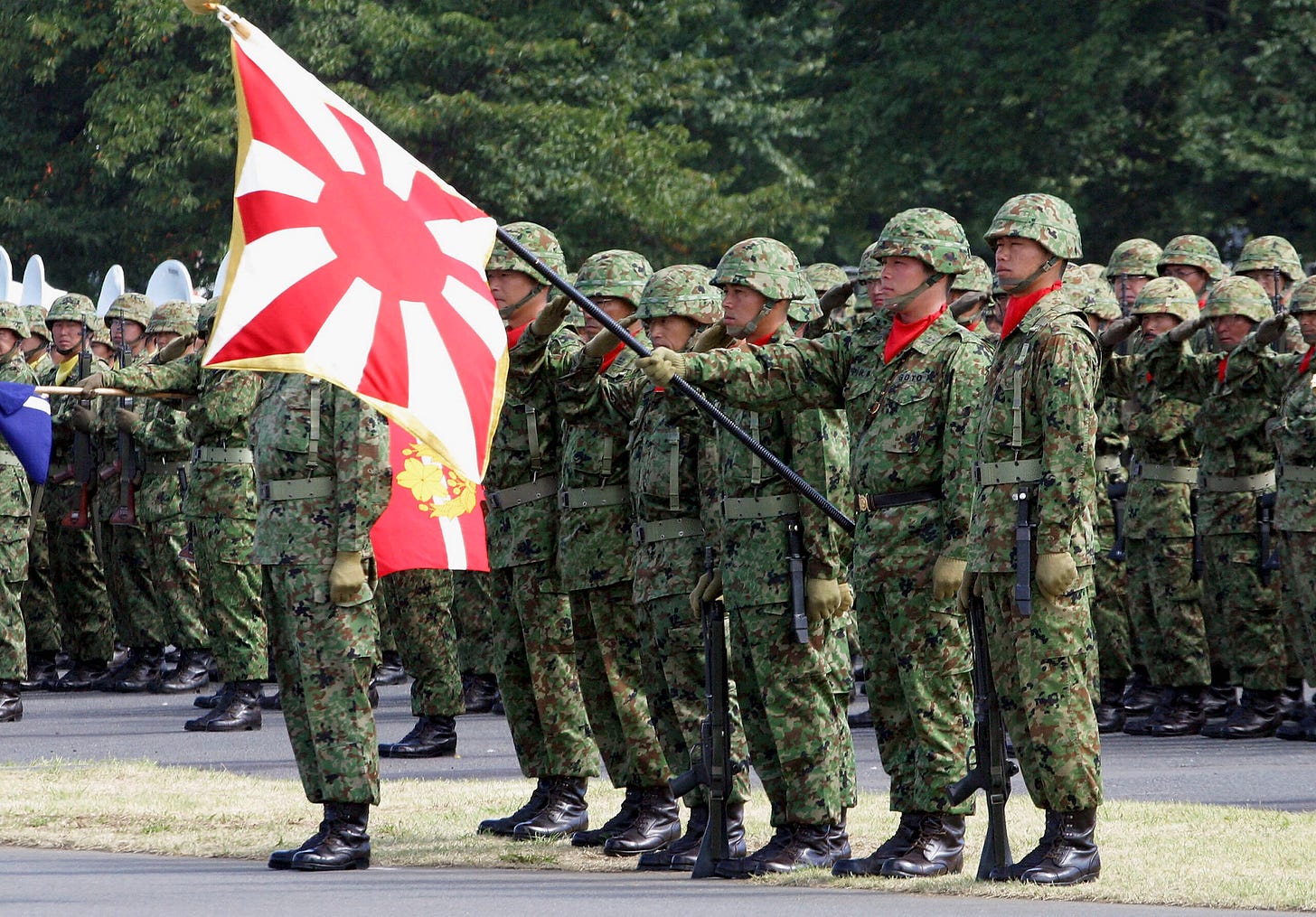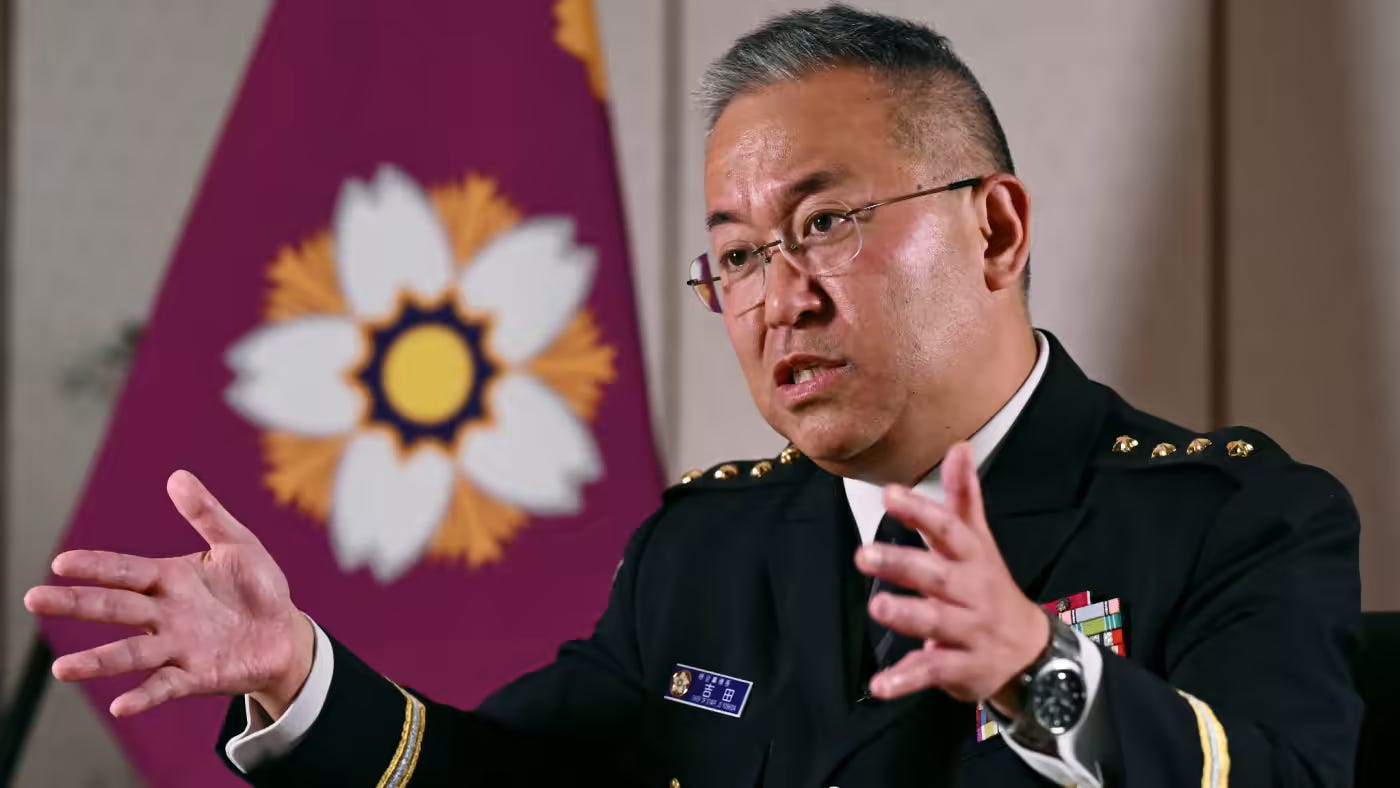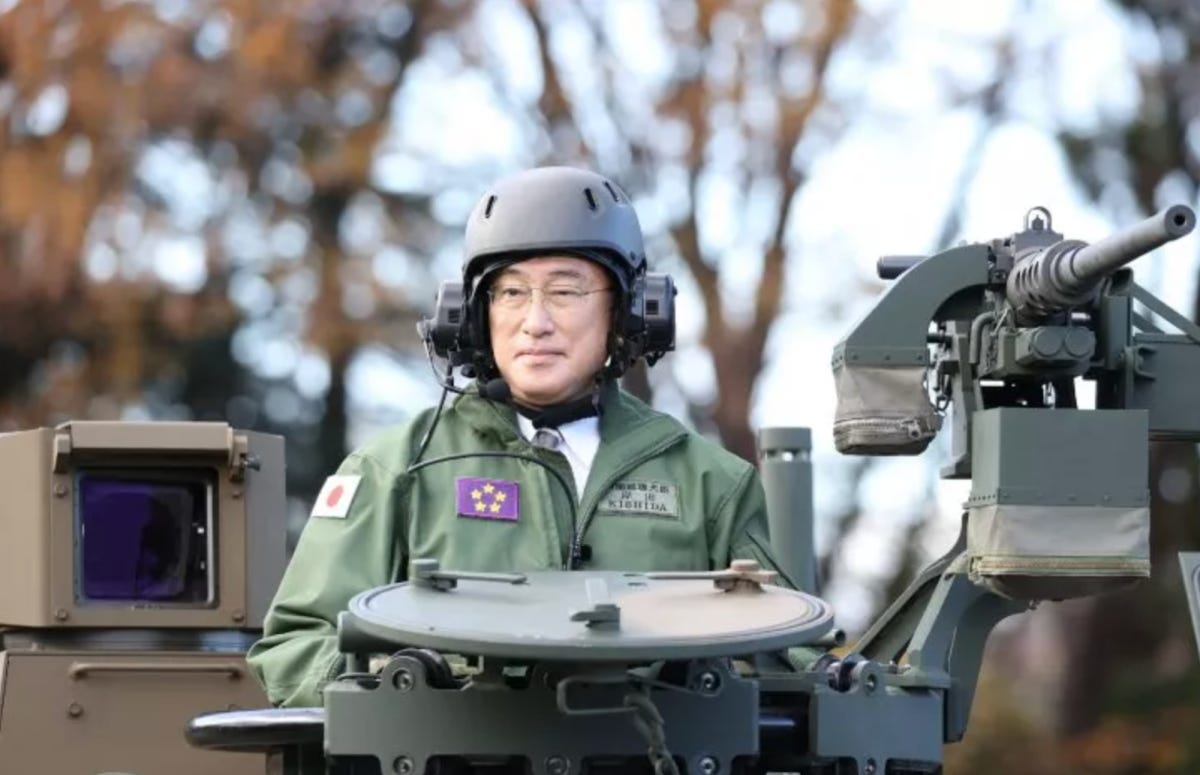Japan Preparing for World Without US
Incredible Interview with Japan's Top General

Washington DC 11 SEP 2023
Japan’s national security establishment is not prone to exaggeration, let alone alarm. They rarely speak at all, leaving announcements to the government. When they do speak it is in a carefully calibrated diplomatic language where nuance is wielded with the precision of a scalpel. That backdrop makes the following interview with Japan’s top General, Yoshihide Yoshida, frankly stunning.1
Key Takeaways
Japan is preparing itself for a future where the US alliance may be significantly diminished.
Accordingly, Japan is rapidly diversifying its alliance arrangements. Its sole alliance with the US will be augmented by new partnerships with Australia, India, and other non-traditional partners like the ROK, the Philippines, Indonesia and Vietnam.
The outlook of the Japanese people on strategic affairs and the role of the Japanese Self Defense Force “is changing dramatically.”
Incredibly, this includes hints at adopting a nuclear deterrent.
The JSDF is behind the capability/capacity curve to meet a future characterized by the above factors. It is engaged in a rapid build up not just of military power but political messaging to encourage support among the people for these changes and to deter aggression from China, the DPRK and their fellow travelers.
The Japan-US Alliance is Unprecedented
The relationship between the US and Japan is unique. It is hard to credit the arc of the relationship from mortal enemies in a war of annihilation culminating in the use of nuclear weapons, through military occupation, to the imposition of an alien political system on the Japanese people, to continued US military basing since WWII. The expected reaction to such a timeline is a never-ending resistance and abiding hatred, as witnessed most recently in Afghanistan and Iraq. Instead, Japan adopted the best of its former foe’s political and cultural offerings, right down to a passionate love of democracy and baseball, and the two have come to share a genuine, deep, abiding mutual respect and friendship. That remarkable history was formalized in the Treaty of Mutual Cooperation and Security between the United States and Japan in 1960, which is one of five formal strategic alliances the US has in the Indo-Pacific that are on a par with NATO.2
Thunderclap
So when the Japanese equivalent of the Chairman of the Joint Chief’s of Staff gently hints that Japan is preparing for a future where it cannot count on its old friend, that is a thunderclap among dark clouds brewing on the alliance horizon.

General Yoshida responded to a question about American commitment to the region delicately but unmistakably
So far, we have been able to count on U.S. deterrence should there be a crisis. We will [now] increase the things Japan can do on its own. (Emphasis added)
Viewed through the lens of Japanese political culture, that is a stunning rebuke of US commitment to a free and open Indopacific.
General Yoshida explained that the governments announcement of a doubling of defense spending (from 1% to 2% of GDP) is needed to enhance Japanese self reliance
We cannot maintain Japan's security with our current capabilities. We must fundamentally strengthen our defensive capabilities so that we are not underestimated.
Japan and Australia in Agreement on the US and the Need to Boost Defense
Another striking thing about the interview is it perfectly replicates the position of the Australian Government. The Strategic Defense Review released back in April stated the same problem and solution, albeit much more directly.
On the US:
"the United States, is no longer the unipolar leader of the Indo-Pacific. Australia needs to develop the capability to unilaterally deter any state from offensive military action against Australian forces or territory.
On the current force
“The ADF must be able to hold an adversary at risk further from our shores. ADF as currently constituted and equipped is not fully fit for purpose. Australia does not have effective defense capabilities relative to higher threat levels.”
for more on the Australian position see
The Allies are Signaling. Is Washington Receiving?
When two of your key alliance partners publicly declare they no longer trust you to come to their aid and that as a consequence, they will rapidly ramp up their military spending and form new military partnerships outside of your alliance system, maybe its time to reflect on your role in the world? You can say you are a Pacific power all you like. But friends take careful note of what is happening in Congress, the Pentagon, and now, in the Courts. They make their own judgements about US domestic stability and the implications for the maintenance of continued alliance commitments.3 Typically, close friends reserve this kind of “tough love” messaging for behind-closed-doors diplomacy. For this to be out in the open, from the northern and southern anchors of the alliance system in the Indopacific, is unprecedented.4
The End of Pacifism
Domestic politics in Japan has been characterized by a deep pacifist tradition born of the pain of recovery from the shock of nuclear attack, and a concomitant awareness of the futility and extreme costs of wars of aggression and conquest. The public and successive governments have been aligned in their views and outlook on anti-militarism. The Japanese constitution prohibits the possession of military forces and bars governments from making war. The self defense forces (JSDF) came later, and their design specifically curtailed any capability that could project power. Japanese law prohibited dispatch of military units offshore, to include participation in war games, coalitions of the willing, and even peacekeeping missions beyond humanitarian assistance and disaster recovery roles.
A slow evolution away from these restrictions has been taking place since the 1990s.5 Reform initiatives started to accelerate in 2015 when PM Abe passed contentious legislation that allowed Japanese forces to fight overseas for the first time. A subsequent attempt in 2018 to revise Art 9 of the constitution to facilitate a more robust defense of Japan was abandoned.6 That it was even contemplated and publicly discussed was remarkable.
Ukraine
The Russian war of aggression against Ukraine changed everything. Warning in December 2022 that "Ukraine may be east Asia tomorrow”, Japanese Prime Minister Fumio Kishida described Japan and its people as being at a "turning point in history” as he unveiled Japan’s “biggest military build-up since World War Two”. He insisted that “we must never tolerate a unilateral attempt to change the status quo by the use of force in the Indo Pacific, especially in east Asia."

Retuning to Chief of Staff Yoshida, in his 29 Aug 2023 interview, he said it was imperative for the “public to recognize the strategic environment facing Japan” and that “Japan is on the front lines of this fight in the Indo-Pacific”. The message is getting through. Even the ever-sober Reuters commented that the changes in defense policy and posture were once “unthinkable in pacifist Japan”.
General Yoshida observed “how the Japanese people view the SDF is changing dramatically”. This is supported by recent polling. A government poll discovered that 86.2 percent of the public believe that “Japan will be involved in a war or become involved in a war.” In another poll, The Asahi Shimbun found “a record high 64 percent of voters believe Japan should strengthen its defensive capabilities” with only 10% opposed. Not so long ago the numbers would have been reversed in favor of pacifism.
Nuclear Deterrence
One of the primary drivers behind the post-war American alliance system was nuclear non-proliferation.
Australia, Japan and South Korea, each have a formal alliance treaty with the US. An unwritten rule of these treaties is that in exchange for not developing their own nuclear weapons, America guarantees the security of these allies against nuclear attack, by extending US nuclear deterrence to “cover” our allies - which is why its sometimes called the “nuclear umbrella”.
Accordingly, Japan has been protected by America from nuclear attack since 1960. So why would Gen. Yoshida raise the issue in a way that sounds like it is a fresh discussion?:
We have been engaged in a deep dialogue with the U.S. since 2010 on extended deterrence -- extending the U.S. nuclear umbrella over Japan. We need to do what we can to sustain extended deterrence, including through strategies involving U.S. nuclear weapons.
On the surface, this sounds like it could be standard mil-to-mil negotiations about improving information sharing and command and control arrangements. This has happened most recently with the Republic of Korea (ROK). In that case, it was an American response to ROK concerns that they were being left out in the open.
A strategic analyst at South Korea's defense ministry cautioned the US that "If the U.S. hesitates to retaliate [against a Russian tactical nuke in the Ukraine war] with nuclear weapons, North Korea might think it could use nukes," he said. "If so, arguments for possessing nukes will further gain momentum in South Korea.” This is not an isolated government hard-line position. “Some polls in South Korea show about 70% popular support for acquiring nuclear weapons.
As a consequence, at a White House meeting with President Yoon, on April 26, the US announced that it would “enhance” its extended deterrence to protect South Korea by establishing a joint nuclear planning and decision-making unit with South Korea.7 This appears to have satisfied the South Koreans. For now.
Breaking defense noted back in November 2022 that
Japan’s ambassador to Australia, Amb. Shingo Yamagami, told the conference his nation was prepared to host Australia’s future nuclear submarines and wants to participate in the AUKUS alliance on “specific projects.”
“Japan stands ready to discuss with Australia, the US and the UK areas where we can co-operate bilaterally on defence technology,” he said.
This is not a one-off event. In a remarkable op-ed in Nikkei Asia just recently it was reported that
In February, “a Japanese defense study group chaired by Ryoichi Oriki, a former military chief of staff, suggested Japan ease its three nonnuclear principles that prohibit possessing, producing or allowing entry into Japan of nuclear weapons.”
Thirdoffset’s network in Japan reports that Japanese officials keep quiet on the nuclear options ‘on the surface’. Like South Korea, and more than Australia (that does not have nuclear power reactors), Japan has the technical capability to develop nuclear weapons in very short order.
Gen Yoshida knows full well that currently Japan remains under the US nuclear umbrella. So what is his purpose in this messaging? It seems likely he is very softly hinting to American audiences that Japan is resolved to do whatever it needs to do to protect itself in the future. Including a future without America taking the lead or without America at all. Exactly what the Australians were signaling back in April. A nuclear deterrent is the only cost effective guarantee for a medium power to lock China out.
The Yoshida statement is not definitive nor it is the end of the intra-allied nuclear proliferation messaging. It is a beginning. America’s closest friends are saying that they do not have unconditional faith in the continuation of democracy in the United States. They know they cant match China missile for missile and ship for ship. So they are joining together, aside from their relationships with America, and they are looking ahead to a day where they may need to acquire their own nuclear deterrent because they judge there is a realistic chance America will fail them.
Disure: When Thirdoffset was a US war college professor, he always had a Japanese officer as one of two international guests in his classes. This was unl. Normally there would be random allocation of foreign students. One year, someone in authority let slip that a quiet back channel request had been made to place JSDF officers in my class. Over the years I noticed that the incoming students from Tokyo were becoming more concerned and focused on the Chinese threat. This was a long time before the US pivot. I took that to mean the JSDF was very alive to the problem but was leading public opinion that at the time remained robustly pacifist. It has been fascinating to see just how rapidly all this has changed.
Although unlike NATO, do not have an permanent alliance bureaucracy and joint forces.
The implication here is both Australia and Japan have decided the US will be unable or unwilling to maintain its level of commitment to a free and open Indopacific in the short to medium term. Their defense spending is a vote of no confidence in America. Only an idiot would think it’s about meeting an arbitrary spending level demanded by a failed former president under indictment in multiple jurisdictions, who conducted foreign policy like a mobster protection racket: harsh on allies and rewarding to dictators.
The public airing of divisions among NATO partners is a common event. Its not in Asia.
The recent evolution of the role of JSDF is summarized here by Brad Glosserman
In 1992, Japan passed laws that enabled SDF participation in United Nations peacekeeping operations. The 1997 revisions to the Guidelines for Japan-U.S. Defense Cooperation extended the jurisdiction of the SDF to address “situations in areas surrounding Japan.” The SDF joined international efforts after the Sept. 11, 2001, terrorist attacks, supporting Operations Enduring Freedom and Iraqi Freedom. That participation was tightly circumscribed by national law and political consensus.
It is worth noting that there is a long and complex history to these events, for example, revising the US imposed constitution has always been a plank of the LDP.
You cant “enhance” extended deterrence. It’s like pregnancy. It’s a binary situation. Such are the hoops of diplomatic language officials on both sides are willing to jump through to reassure one another than basic extended deterrence remains unchanged.




Your discussion of the fate of Ukraine is right on target. Putin has demonstrated how a leader-for-life can unilaterally transform the peaceful order. President Jingping is now the leader-for-life in China and who knows if/when he will snap like Putin. Not to mention Kim Jung Un and his menacing and erratic behavior.
I can see why these powerful countries in the Indo Pacific would want to ramp up their defense in the face of these threats. Not to mention the real potential that the U.S. may elect a pathological narcissist and sociopath in the next election and who knows what happens then?